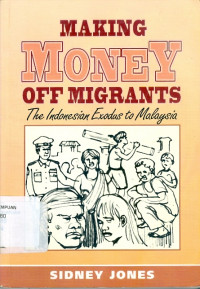
Text
Making money off migrants: the Indonesian exodus to Malaysia
It examines the stages through which migrants move from recruitment in their villages to their travel to a departure point in Indonesia to arrival in Malaysia and often, to eventual arrest and deportation. Diffusion of new ideas via international migration is an interesting phenomenon if one wants to study social change. This is a case study that examines the role of migration in understanding diffusion and transmission of skills and knowledge into the home country of foreign workers. It looks at a specific group of migrant workers in the plantation sector in Malaysia and how their position as Indonesian migrants facilitates and encourages transmission of cultural elements to their home country. It means examining their experiences in Malaysia to know the extent to which they can be agents in the diffusion of new skills and knowledge in the local community. Drawn from a qualitative study in 2010, both interview and focus group discussion were conducted among Indonesian workers in oil palm plantation in Johor, in the southern part of Malaysia. The study finds that social remittance is only realistic and feasible when workers have the financial means to possibly carry out the new ideas and skills they have observed, acquired and learned. These ideas and skills may also be very limited to the kind of exposure they have experienced while living in Malaysia considering the limitations they encountered. Actual application of ideas and skills they have acquired and remitted to their home country still largely depends on the availability of finances and the migrant workers agency when they will eventually return to Indonesia. Diffusion can only be realized when a ‘friendly’ environment is available for the diffusion of new ideas
Availability
| KP.X.000068 | KP X.JON m | My Library | Available |
Detail Information
- Series Title
-
-
- Call Number
-
KP X.JON m
- Publisher
- Hong Kong : Asia 2000., 2000
- Collation
-
vii, 157p. ; 22cm.
- Language
-
English
- ISBN/ISSN
-
9627160830
- Classification
-
KP X
- Content Type
-
-
- Media Type
-
-
- Carrier Type
-
-
- Edition
-
-
- Subject(s)
- Specific Detail Info
-
-
- Statement of Responsibility
-
-
Other version/related
No other version available
File Attachment
Comments
You must be logged in to post a comment
 Computer Science, Information & General Works
Computer Science, Information & General Works  Philosophy & Psychology
Philosophy & Psychology  Religion
Religion  Social Sciences
Social Sciences  Language
Language  Pure Science
Pure Science  Applied Sciences
Applied Sciences  Art & Recreation
Art & Recreation  Literature
Literature  History & Geography
History & Geography